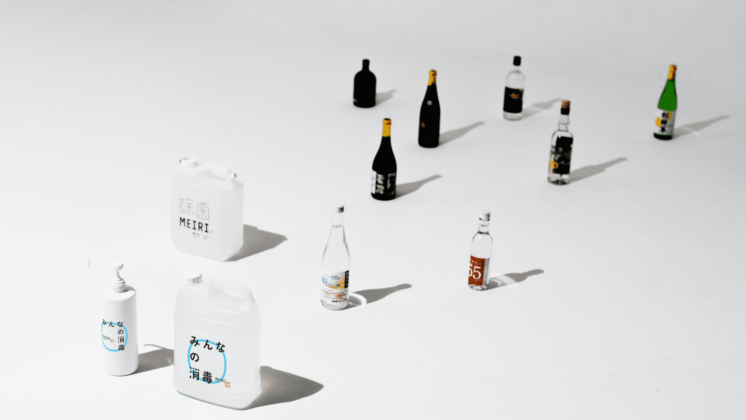Japan, like many countries, is looking for novel strategies to crack down on new waves of COVID-19. In Tokyo, as a third state of emergency went into effect on April 25, it was alcoholic beverages that fell under scrutiny. Restaurants were requested not to provide any alcohol, whether during lunch or dinner time. But the order impacted many businesses beyond restaurants, as well.
Meiri Shuri Co., Ltd is one such business—a small-scale producer of various spirits such as sake, umeshu, and shochu. The history of Meiri Shuri goes back four generations, to around 1800. It became an incorporated company in 1950 and today does business all across Japan, as well as globally. But despite that legacy, it’s still a traditional company in the small city of Mito. With government orders working against the alcohol industry, Meiri Shuri had to adapt its strategy fast to survive the pandemic.
The solution was one that has become popular among other breweries around the world: hand sanitizer production. But this was no easy switch. Meiri Shuri had some tough obstacles to overcome.
Family businesses with long histories are slow to adapt. It took a strong sense of purpose, dedicated communication, and leadership to move things along. Takahiro Kato, son of Meiri Shuri’s founding family and alumnus of GLOBIS, is the young man who achieved all three for his family’s business. He did it by asking himself three key questions.

1. What is the true meaning of work?
Kato had been in Tokyo for six years when the pandemic hit, working for global top ten integrated marketing solutions company Hakuhodo. He’d done well for himself, even getting featured by the media. Then one day, he got a call from his father back at the brewery.
“He told me that he might need to lay off some of his employees,” Kato recalls, “and that he might step down as CEO.”
After the call, Kato thought about his family business and his place in its legacy. His long-term plan had always been to go back to Mito and contribute to the community. But somehow, though he’d been gone since graduating high school ten years earlier, it still felt much too early for that. As he thought more about his current job in Tokyo, he began to question the true meaning of work. Could he feel satisfied with his job in Tokyo while his hometown, region, and family business struggled?
The original timeline for his return became less and less important. He decided he had to return to Mito sooner, rather than later.
2. How can my business fill needs in the community?
There was little time to relax and adjust to life back home. COVID-19 posed a real, constant threat to the family business. Kato quickly realized that Meiri Shuri needed to change its business model to survive. He also identified a pressing need in the city: shortage of sanitizer.
“We had a strong desire to solve a social issue in our community. It’s a company philosophy we all share,” Kato explains. “After the 3/11 earthquake, there was a shortage of water in the community. We took the water we use to make sake and distributed it to the neighborhood. I wanted to do something like that again.”
In April 2020, the Ministry of Health, Labor, and Welfare announced that vodka could be used as a substitute for hand sanitizer. Kato decided the answer was a new product: Meiri Shuri 65%, Japan’s first highly concentrated alcohol.And because there was a need, Meiri Shuri paid for its own shipping costs to distribute nationwide. Eighty other sake breweries across the country followed suit.
A month later, the National Tax Agency announced that vodka and other highly concentrated alcohols would be exempt from the liquor tax. Meiri Shuri reduced its prices to reflect the tax exemption, then began developing a new brand: Jokin Meiri (Meiri Sanitizer). With high demand and a slick product design by Hakuhodo, Kato’s old employer, Jokin Meiri’s commercial success seemed assured. But Meiri Shuri wasn’t just in it for the money—the company wanted to help the community.
To start, Meiri Shuri donated about 200kL of Jokin Meiri to a local middle school and Mito City. But the contribution to public health (and the company’s new direction) didn’t end there.
At the end of May 2020, Meiri Shuri decided to start a new quasi-drug business. Despite nearly overwhelming twelve-to-one odds, the company obtained a subsidy from the Ministry of Economy, Trade, and Industry to build a new sanitizer factory. It finally opened in April 2021.
“We clarified our vision and forecasted the future,” says Kato, prouder than ever of his family’s business. “Sanitizer was our new infrastructure, and it allowed Meiri Shuri to become a brewery that also contributes to public health.”

3. How can I get my employees to support my mission?
Kato reflects that “all of these changes were not easy.” It was especially hard to convince other Meiri Shuri employees that the new business was important. They’d devoted themselves to sake manufacturing—what were they doing making sanitizer?
“I shared my vision more than thirty times, trying to convince people. I acknowledged that yes, our family business was founded on the sale of alcohol, and assured them that yes, our articles of incorporation covered pharmaceutical manufacturing. I tried every angle, but at the end of the day, we needed a mindset of social contribution and change under COVID-19. That was what finally moved people.”
It wasn’t just words that convinced them, however—it was what Kato calls “the sandwich.”
The slice of bread on top was involving management, while the slice of bread on the bottom was empowering young employees to implement the project at the ground level. Just as this approach required more than top-down management, its implementation required more than Kato’s leadership. Kato enlisted a young employee named Takahiro Yamanaka as his right-hand man. “Yamanaka had the same vision as me,” says Kato. “He took on the role of involving other young employees like himself.”
Thanks to the sandwich, Meiri Shuri saw a sharp improvement in communication toward its vision.
What are you working for?
Changing business models, especially for traditional family businesses, is no easy task. But Kato’s steps to transform Meiri Shuri into a comprehensive alcohol company are getting results. Thanks to a hefty investment 100 million yen (over $900K USD) for a new factory, production has reached 192,000 liters per month. This was unimaginable just a year ago.
“Once I realized that I work for Mito and my family,” says Kato, “I stopped comparing myself to others and started to focus on Meiri Shuri. This organization embodies my aspirations, as well as those of the people around me. We’ve come a long way, but we’re not done. I want to continue to change Meiri Shuri for the new era.”
Above all, Kato emphasizes the importance of asking yourself what you work for. This question sparked major changes in his life: his career change from a big company to his small family business, his return to Mito, and his drive to transition his company. Reflecting on the deeper purpose of your work and career can accelerate your career trajectory—or even set you on a path you never imagined.



